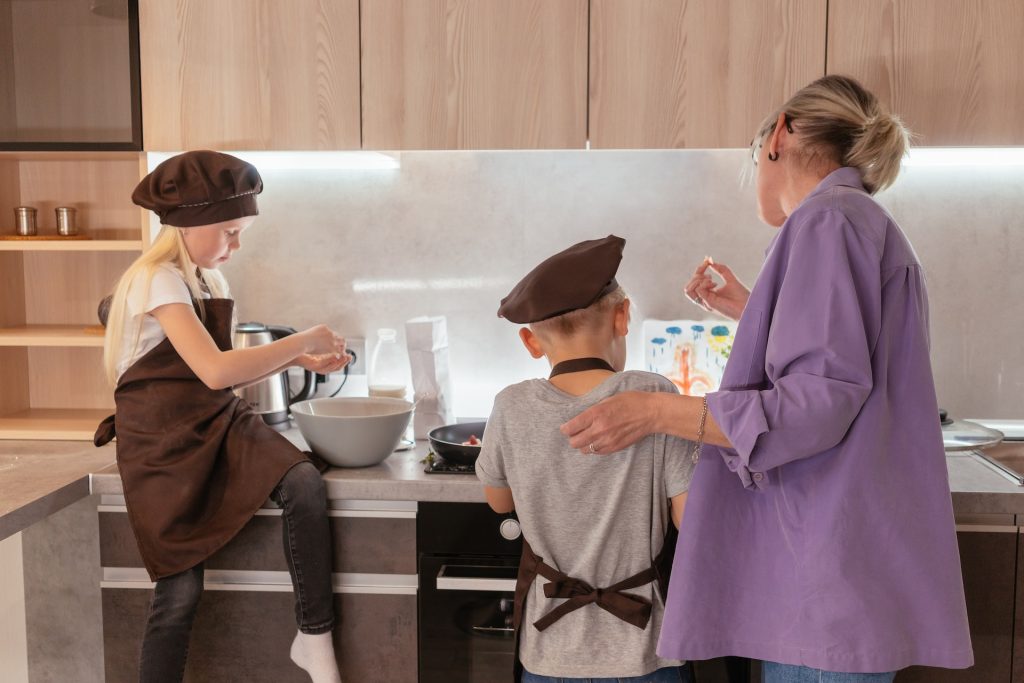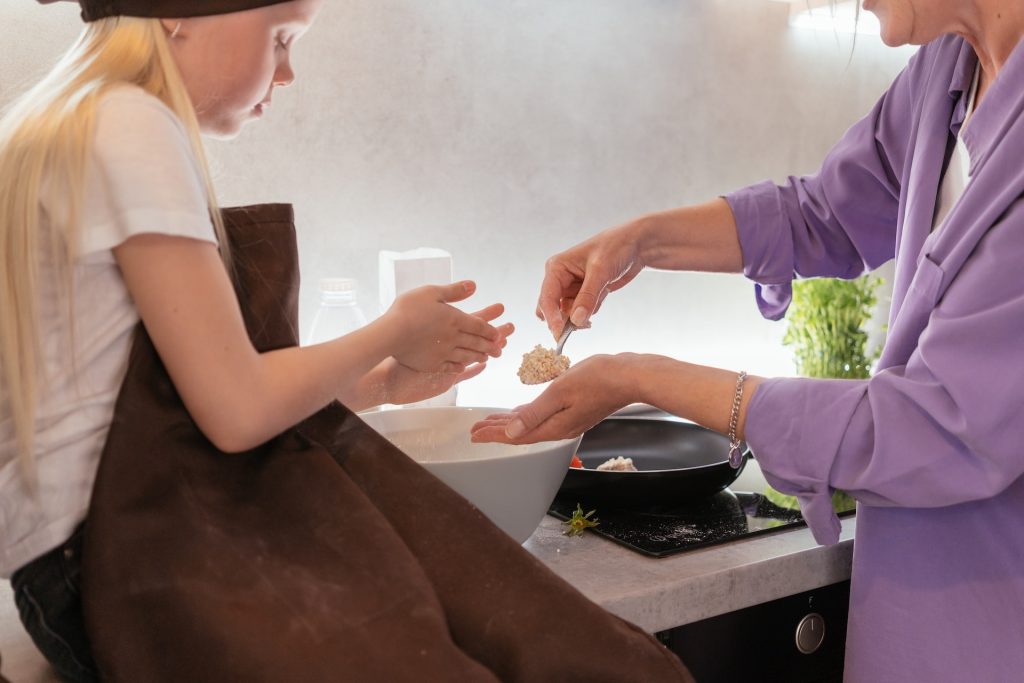Discover a comprehensive step-by-step guide on teaching cooking to 10-11 year olds.
Teaching Cooking to 10-11 Year Olds: A Step-by-Step Guide
Welcome to this step-by-step guide on teaching cooking to 10-11 year olds! Cooking is not only a practical skill, but it also promotes creativity, independence, and healthy eating habits. In this article, we will explore the importance of teaching cooking skills to children and provide tips on how to make the learning process fun and engaging. So let’s dive in and get cooking!
Understanding the Importance of Teaching Cooking Skills to Children
Nowadays, when fast food and processed snacks dominate the market, teaching children how to cook has become more crucial than ever. By introducing them to the art of cooking at a young age, we can set them on a path towards a lifetime of healthy eating habits.
But why is teaching cooking skills to children so important? Let’s explore the benefits in more detail.

The Benefits of Cooking for Cognitive Development
Did you know that cooking can enhance cognitive development in children? When kids follow recipes and measure ingredients, they practice their math skills and learn about fractions. They get hands-on experience with measuring cups and spoons, understanding the concept of volume and proportions. As they read recipes and understand food labels, their reading comprehension is also boosted. So, cooking is not just about delicious meals, but it also helps sharpen their minds.
Moreover, cooking involves following a sequence of steps, which helps children develop their sequencing and organizational skills. They learn to plan and execute tasks in a logical order, enhancing their problem-solving abilities.
Encouraging Healthy Eating Habits Through Cooking
One of the greatest benefits of teaching cooking to children is instilling a love for healthy food. By involving them in the cooking process, we can teach them about nutrition and the importance of making nutritious choices. Children learn to identify different ingredients and understand their nutritional value. They become aware of the benefits of consuming a balanced diet and develop a preference for fresh, whole foods over processed alternatives.
Additionally, children are more likely to eat what they have helped prepare. By allowing them to take part in meal preparation, we empower them to make healthier choices and develop a positive relationship with food. Cooking together becomes a bonding experience, where families can explore new flavors and experiment with different recipes.
Building Confidence and Independence in the Kitchen
Cooking empowers children by giving them a sense of accomplishment and boosting their self-esteem. When kids master a recipe or create a dish from scratch, they feel a sense of pride in their abilities. They learn that they are capable of creating something delicious and nourishing.
Furthermore, cooking teaches children important life skills. They learn to follow instructions, understand the importance of cleanliness and safety in the kitchen, and develop patience and perseverance. As they gain experience, they become more independent in the kitchen, able to prepare meals for themselves and contribute to family meals. These skills set them up for success in the future, as they become more self-reliant and confident in their abilities.
So, teaching cooking skills to children is not just about creating tasty meals. It is a valuable opportunity to enhance their cognitive development, encourage healthy eating habits, and build confidence and independence in the kitchen. By investing time and effort in teaching children how to cook, we are equipping them with essential life skills that will benefit them throughout their lives.
Preparing for Your First Cooking Lesson
Before jumping into the kitchen, it’s important to prepare for your cooking lesson. Here are a few essential steps to ensure a successful experience:
Preparing for your first cooking lesson can be an exciting and rewarding experience. Not only will you be learning a valuable life skill, but you’ll also be able to create delicious meals and treats to share with your loved ones. To make the most out of your cooking lesson, there are a few important factors to consider.
Choosing Age-Appropriate Recipes
Selecting the right recipes is crucial when it comes to teaching young chefs. For 10-11 year olds, it’s important to choose recipes that match their skills and attention spans. Simple recipes with clear step-by-step instructions are ideal for beginners. This will help them build confidence in the kitchen and develop a solid foundation of cooking techniques. Additionally, remember to consider any dietary restrictions or allergies that your young chefs may have. This will ensure that everyone can enjoy the fruits of their labor.
When selecting recipes, try to choose dishes that are not only delicious but also visually appealing. This will help spark the interest and creativity of your young chefs, making the cooking experience even more enjoyable.
Gathering Essential Cooking Tools
Having the right tools is essential for any successful cooking lesson. Before you begin, make sure your kitchen is equipped with child-friendly cooking tools. Child-sized knives, mixing bowls, and measuring cups will make the cooking process safer and more enjoyable for your budding chefs. Having their own utensils will make them feel more involved and independent, fostering a sense of ownership and pride in their cooking skills.
Aside from the basic cooking tools, consider incorporating fun and colorful kitchen gadgets that will capture the attention of your young chefs. This can include novelty-shaped cookie cutters, colorful silicone spatulas, or even mini-sized whisks. These small additions can make a big difference in keeping your young chefs engaged and excited about their cooking lesson.
Ensuring Kitchen Safety for Kids
Prioritizing kitchen safety is of utmost importance when teaching children how to cook. Before you begin your cooking lesson, take the time to teach children basic safety rules. Explain to them how to handle hot surfaces and utensils, use oven mitts, and properly store sharp objects. Emphasize the importance of washing hands before and after handling food to prevent the spread of germs.
Supervise your young chefs closely during the cooking process, providing guidance and support as needed. Encourage them to ask questions and seek clarification whenever they are unsure about a particular step. By fostering an open and communicative environment, you can ensure that your young chefs feel safe and confident in the kitchen.
Additionally, it’s important to teach children about the importance of cleanliness and hygiene in the kitchen. Show them how to clean up spills promptly and properly, and how to wash dishes and utensils thoroughly. These skills will not only help them become better cooks but also instill lifelong habits of cleanliness and responsibility.
By following these essential steps, you can create a positive and enriching experience for your young chefs. Cooking lessons not only teach valuable life skills but also provide an opportunity for creativity, teamwork, and self-expression. So, get ready to embark on a culinary adventure and watch your young chefs blossom into confident and skilled cooks!
Conducting the Cooking Lesson

Now that you’re well-prepared, it’s time to dive into the cooking lesson! Here’s how to make it an enjoyable and educational experience:
Explaining the Basics of Cooking
Start by introducing the basic concepts of cooking. Teach them about different cooking methods, such as boiling, sautéing, and baking. Explain the importance of measuring ingredients accurately and following recipe instructions.
Cooking is not just about following a recipe; it’s about understanding the science behind it. Take the time to explain to the children how heat transforms ingredients, how proteins denature, and how flavors develop. This knowledge will not only make them better cooks but also ignite their curiosity about the culinary world.
Furthermore, introduce them to the different tools and utensils commonly used in the kitchen. Show them how to handle knives safely, how to use measuring cups and spoons, and how to operate kitchen appliances. Understanding the tools of the trade will make them feel more comfortable and confident in the kitchen.
Guiding Kids Through the Cooking Process
Break down the recipe into manageable steps and guide children through each one. Allow them to take the lead where appropriate, but always be there to offer guidance and support. This hands-on experience will help them gain confidence and develop their cooking skills.
As you guide the children through the cooking process, take the opportunity to explain the importance of different ingredients. Talk about the flavors they bring, the role they play in the recipe, and how they can be substituted or modified to suit personal preferences. Encourage the children to taste and experiment, fostering their creativity and palate development.
Additionally, share interesting anecdotes and stories related to the recipe or the ingredients being used. For example, if you’re making a traditional dish, discuss its cultural significance and the history behind it. These stories will not only make the cooking lesson more engaging but also broaden the children’s culinary knowledge.
Promoting Cleanliness and Organization in the Kitchen
Teach children the importance of cleanliness and organization in the kitchen. Instruct them to wash their hands properly, clean as they go, and keep their work areas tidy. Encourage them to take pride in their cooking space and develop good habits that will carry over into their everyday lives.
Explain the concept of cross-contamination and the risks it poses to food safety. Show them how to properly separate raw and cooked ingredients, use different cutting boards for meats and vegetables, and sanitize surfaces after handling potentially harmful ingredients. By instilling these practices, you are not only ensuring their safety but also nurturing responsible and hygienic habits.
Furthermore, discuss the importance of sustainability in the kitchen. Teach them about reducing food waste, recycling packaging, and using eco-friendly alternatives. Encourage them to think about the environmental impact of their cooking choices and how they can make a positive difference.
Lastly, emphasize the joy of sharing food with others. Talk about the pleasure of cooking for loved ones and the satisfaction of seeing others enjoy the fruits of their labor. Encourage the children to share their culinary creations with family and friends, fostering a sense of community and connection through food.
Making Cooking Fun and Engaging for Kids
We all know that children learn best when they’re having fun! So, let’s make cooking a playful and engaging activity for your young chefs:
Incorporating Games and Challenges into Lessons
Spice up your cooking lessons by incorporating games and challenges. For instance, you can set up a mystery basket challenge where children have to create a dish using only a few surprise ingredients. This not only ignites their creativity but also makes cooking feel like a fun adventure.
Encouraging Creativity and Experimentation
Give kids the freedom to experiment and express their creativity in the kitchen. Encourage them to add their own twist to a recipe or come up with their own creations. This allows them to take ownership of their cooking journey and fosters a sense of exploration and innovation.
Celebrating Successes and Learning from Mistakes
Lastly, celebrate each small success and encourage children to learn from their mistakes. Cooking may not always turn out perfectly, but that’s part of the learning process. Help them see failures as opportunities for growth and improvement. Remember, the joy is in the journey!
So, grab your aprons, gather your ingredients, and embark on this exciting cooking adventure with your 10-11 year olds. By teaching them valuable cooking skills, you’re not only nourishing their bodies but also empowering them to become confident, independent, and creative individuals. Happy cooking!



